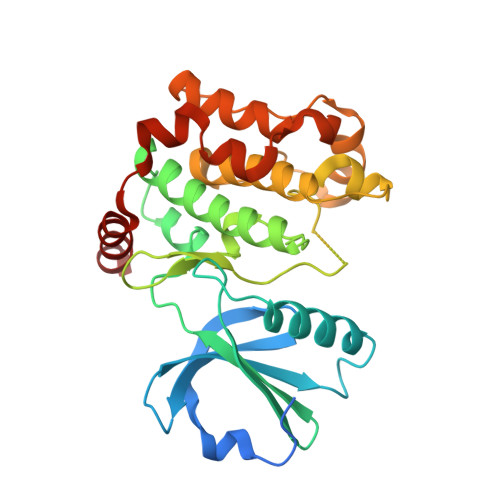Shifting the selectivity of pyrido[2,3-d]pyrimidin-7(8H)-one inhibitors towards the salt-inducible kinase (SIK) subfamily.
Rak, M., Tesch, R., Berger, L.M., Shevchenko, E., Raab, M., Tjaden, A., Zhubi, R., Balourdas, D.I., Joerger, A.C., Poso, A., Kramer, A., Elson, L., Lucic, A., Kronenberger, T., Hanke, T., Strebhardt, K., Sanhaji, M., Knapp, S.(2023) Eur J Med Chem 254: 115347-115347
- PubMed: 37094449
- DOI: https://doi.org/10.1016/j.ejmech.2023.115347
- Primary Citation of Related Structures:
8BIN, 8BIO, 8BZI - PubMed Abstract:
Salt-inducible kinases 1-3 (SIK1-3) are key regulators of the LKB1-AMPK pathway and play an important role in cellular homeostasis. Dysregulation of any of the three isoforms has been associated with tumorigenesis in liver, breast, and ovarian cancers. We have recently developed the dual pan-SIK/group I p21-activated kinase (PAK) chemical probe MRIA9. However, inhibition of p21-activated kinases has been associated with cardiotoxicity in vivo, which complicates the use of MRIA9 as a tool compound. Here, we present a structure-based approach involving the back-pocket and gatekeeper residues, for narrowing the selectivity of pyrido[2,3-d]pyrimidin-7(8H)-one-based inhibitors towards SIK kinases, eliminating PAK activity. Optimization was guided by high-resolution crystal structure analysis and computational methods, resulting in a pan-SIK inhibitor, MR22, which no longer exhibited activity on STE group kinases and displayed excellent selectivity in a representative kinase panel. MR22-dependent SIK inhibition led to centrosome dissociation and subsequent cell-cycle arrest in ovarian cancer cells, as observed with MRIA9, conclusively linking these phenotypic effects to SIK inhibition. Taken together, MR22 represents a valuable tool compound for studying SIK kinase function in cells.
- Institute of Pharmaceutical Chemistry, Johann Wolfgang Goethe University, Max-von-Laue-Str. 9, Frankfurt am Main, 60438, Germany; Structural Genomics Consortium (SGC), Buchmann Institute for Life Sciences, Johann Wolfgang Goethe University, Max-von-Laue-Str. 15, Frankfurt am Main, 60438, Germany.
Organizational Affiliation:


















